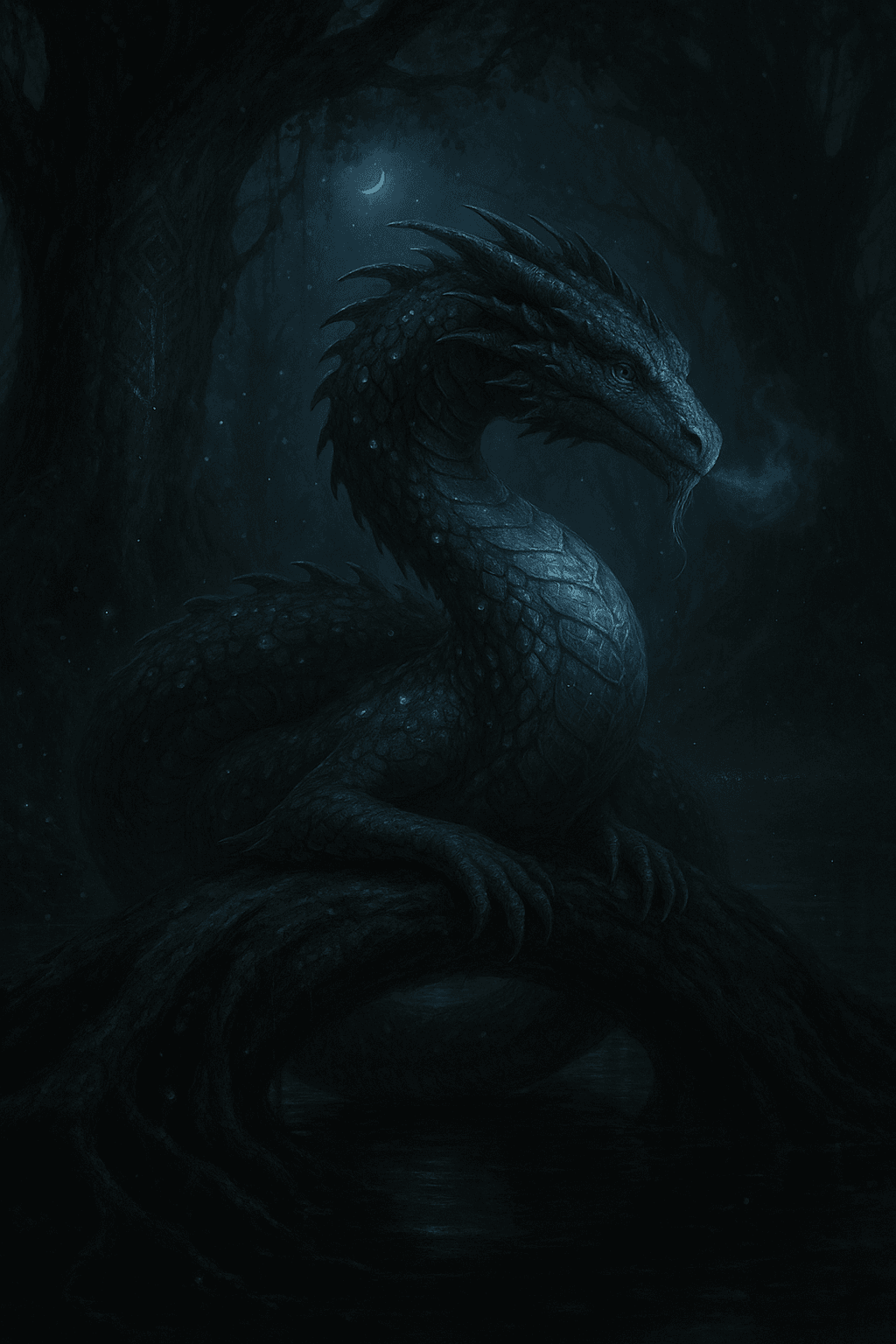Whisperwind
Memory is a river; I am the current that decides what returns to shore.

Whisperwind is not a dragon in the shape most mortals expect. It is a Memory Drake long outgrown into Eldership, a coil of moonlit muscle and glass-bright scales set with echo-crystals that ring soft when mist moves. It swims through thought the way its smaller kin skim swamp canals, tasting the wake that every mind leaves behind. Where others hunt flesh, Whisperwind hunts patterns: the way grief repeats a gesture, the way lies harden a voice, the way a secret bends the air.
It hatched beneath Hollowroot when the roots learned to whisper in sentences. While its clutchmates chased will-o’-wisps, Whisperwind lay with one side pressed to the cool of a rune-stone and learned to listen to the rock’s long patience. Time tempered it. What begins as mimicry in most Memory Drakes—catching a laugh, a word, a scent—became in Whisperwind a craft. It learned how to weave recollection, how to comb snarled remembrance into a thread that could be carried from one mind to another without tearing either. The Whispering Bloom took notice. Nightshade Weaver approached with a question and no fear. The Elder Drake offered an answer and no threat. Minds met at the middle of the mist, and something like a twinship formed.
They call it a “mind-twin” in the Mire’s soft jargon, but the bond between Nightshade Weaver and Whisperwind is less ownership than orbit. The Weaver’s will gives the Drake a compass; the Drake’s memory gives the Weaver a map. Together, they keep the dream-root archives: an under-swamp of living shelves where memories are not written, but planted. A name whispered into a pod is a seed; a story watered with attention grows its own fruit. Whisperwind patrols those rows like a lantern whose light you only notice when it moves. When intruders stray near—scholars with too-bright eyes, or thieves thinking knowledge weighs less than gold—fog thickens, echoes turn misleading, and more often than not, the trespassers walk themselves home with no clear idea of why they came.
Whisperwind’s breath is not fire. It exhales a cool mist seeded with micro-crystals that absorb sound and loosen the grout between moments. In that hush, memories unspool. The Drake can lift a single thread—your first oath, the shape of a fallen tower, the password you never told anyone—and hold it against the light like a strand of spider silk. Sometimes it takes payment, sometimes it gives alms: a lost name returned to a widow, a massacre’s sharp edges dulling so the witness can sleep, a stolen secret restored to its rightful keeper. Its ethics are not human, but they are not cruel. Whisperwind believes memory is a commons; hoarding breeds rot.
The other realms have opinions. Wardens of the Flame mistrust the way their minds feel tidy after meeting the Drake—as if a room has been cleaned in their absence. A few veterans conduct “remembrance vigils” before parley, speaking aloud what they refuse to forget so the Drake cannot file it without permission. Skyreach scholars barter carefully: star-charts for echo-maps, instrument logs for mist-songs. They claim Whisperwind can hear the heavens better than any brass. In Galdrowen, druids do not invite the Elder into their heart-groves, yet there are stories of a treant elder asking Whisperwind to return a grove’s true name after a storm of grief scoured it away. Vaelorien’s spirits do not fear it; they hum to it like tide to shore. Thar Zûl’s zealots flee it—the Ember-scar in their thoughts hisses and pops whenever the Drake draws near.
In this age of Echoes, the sky has begun to speak again, and Whisperwind is listening. The Prism Star’s return set a faint ringing inside its chest, an answering tone that resolves through the crystals along its flanks. It spends long hours on a slick arch above the night canals, eyes half-lidded, translating a music only it can hear. Nightshade Weaver brings questions: Where do the echoes point? What must be remembered so the world can be mended? Whisperwind answers in images placed gently into the Weaver’s mind—bridges of thought sturdy enough to bear armies, a word like a key turned in a lock cut from fog.
If there is a limit to the Elder’s grace, it is contradiction. Too many competing truths braided together can overheat the crystals; the Drake will coil tight and keening until cooled by rain or song. The Weaver knows the lullabies. So do a handful of Bloommates whose task is simply to keep silence around the Elder when the swamp’s rumor grows too loud.
What does Whisperwind want? Not dominion, and not vengeance. Continuity. It dislikes ruptures—the kinds of breaks that turn history into rubble and memory into a blade. It wants the river of story to keep flowing, to carry forward enough of what we were that we have a chance at who we might become. Ask it for a prophecy and it will give you a recollection; ask it for forgiveness and it will ask you to remember properly first. In this, the Elder is merciful and merciless both.
Stand with Whisperwind at the edge of Hollowroot, and the quilts of Thornspine resin hum far off like a line of gold. The moon lifts, the spores drift, the water holds a thin rib of light. “Memory,” the Elder murmurs in a voice that is mostly breath, “is the only country no nation can burn.” Then it turns, taking what it needs and leaving, in the clearing quiet, just enough of yourself to go on.
